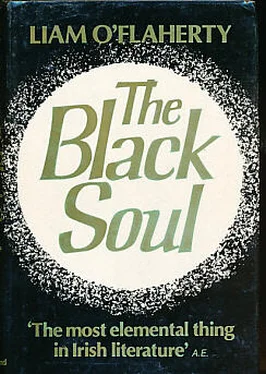The noise of horse’s hoofs came to them from the lane. The sounds were uneven as of a horse ridden by an unskilled rider. Then loud shouting was heard and Little Mary ran out. The pony was standing at the door. He was champing at the bit and kicking his belly with his right hind leg, for never in his life before had a saddle touched his back or a bit been in his mouth. In Inverara it was considered unmanly to use anything on a horse but a rope halter, and a rough blanket to protect the crutch from the horse’s spine. The new doctor sat on the pony’s back, Dr. Cassidy’s successor (Dr. Cassidy had been forced to retire in his eightieth year because of a petition being lodged with the County Council by the islanders). The new doctor was from Dublin. He considered himself an important person and therefore always insisted on riding a saddled horse to visit a patient. Being too mean to buy a horse and feed it, he bought a cheap saddle and reins instead and compelled the islanders to bring him their horses for his use. He sat on the pony’s back, a white muffler wound many times around his neck, in brand-new russet riding-breeches and gaiters like an English sportsman in a film picture. He wore a hard bowler hat perched on his square head. The trimmest of clipped moustaches covered his upper lip. He cracked his whip timorously, taking care not to touch the mare with it. He sat there waiting, either because he was unable to dismount without assistance or because he considered it proper for a gentleman to wait until somebody held the stirrup. They called him Dr. Aloysius Rogan at the post office and on Government papers, but the peasants called him ‘the Son of the Potman,’ because they said his father kept a public-house in the Dublin slums.
Little Mary helped him to dismount. He leaned against her more heavily than was necessary. In his own estimation he was ‘a devil among the girls,’ and he had ‘his eye on Little Mary’ for a long time. A group of peasants that had rushed out of their cabins as soon as the arrival of the doctor was reported by a dirty boy who had been digging for a rat in the fence beside the road, gathered around Red John’s Gate, spitting from their throats needlessly and rubbing the backs of their hands across their mouths. The doctor paused a moment to inquire the name of the village, although he knew it quite well, and then entered the cabin. The peasants leaned over the fence and passed disparaging remarks on the doctor, the saddle, and on Red John for not tightening his mare’s hind shoes.
‘Does he think a horse is a donkey, the son of a lame monk?’ said one.
‘Who the devil is sick, God forgive us?’ said another.
‘It’s the Stranger, and no wonder God would stiffen his blasphemous tongue,’ said another.
‘No, no, curly Stephen,’ said another, ‘sure it’s the war has stricken the poor man. He bought me a drink the other night. He is good-natured and God-fearing.’
‘Begob,’ said a large-eared man with a coarse laugh, ‘I thought it was how Red John had brought his boat into port at last,’ meaning that he thought Red John was about to become the father of a family. They all laughed.
The doctor stood for fully a minute in the kitchen taking off his gloves. He smelt the walls all round like an excise officer smelling for illicit whisky. He handed his gloves to Little Mary and looked at her deeply as she took them. Then the Stranger’s voice came from the room harshly.
‘Who the devil is that, Little Mary?’ he cried.
The doctor arched his eyebrows and shrugged his shoulders. He went to the door of the Stranger’s room and thrust in his head and right foot like a man going to visit a prize sow in a pigsty. He saw the Stranger lying on the bed, the long pale hands lying over the coverlet, the black eyes gleaming, looking fiercely at him, the brown beard giving the face the expression of a beachcomber. He shrugged his shoulders again and advanced into the room. His face was set in an expression that he had studied in the Dublin hospitals when he realized that his abilities would never allow him to aim any higher than a practice among peasants or in the slums. It was a disdainful, condescending expression.
‘Well, my man,’ he said, ‘how do you feel?’ Then without waiting for an answer he turned to Little Mary and said, ‘Does the sea ever come down as far as this from the beach? What did you say the village was called? Ro-ro-rooy, oh! Funny name.’ Then immediately he forgot Little Mary and his question, began to whistle ‘Over the waves,’ took from his shoulders the shooting-bag that held his instruments and began to open it on the table. Little Mary stared at him with a brooding expression in her eyes, as if he were a dangerous animal. The Stranger turned on his side and glared at him. He was fuming inwardly against ‘this impertinent fellow,’ but he was afraid to say anything. He was more afraid of death than he was insulted by the attitude of the doctor. Would the doctor be able to assist him? Would he be able to cure that catching in the chest, when the heart beat too quickly? Would he be able to stop the trembling of the limbs when fear struck him? Would he be able to dispel the visions from the brain? He was ashamed too of the position in which the doctor found him, lying in the cabin of a peasant. He struggled between shame and fear and hope and anger on the bed, until at last the doctor approached him with a stethoscope. Then he felt a desire to jump up and strangle the doctor, in order to rid himself of this complex tangle of emotions by some sudden physical act. But that impulse vanished immediately. He felt a kind of careless resignation, much the same as the soldier feels when he is being court-martialled and he knows that no effort of will or of body or no strength of evidence will have any effect on the stupidity of his judges or on the mighty machine that they control.
The doctor sounded his chest and back. He tapped his knees. He put his hand before his eyes, ordering him to look at a point on the wall in a voice one would use talking to a stone man. He looked at his tongue and put a lens down his jaws and peered at it. He tapped the teeth casually with the lens. He pressed his finger against the cheekbones and watched the blood crawling back over the whitened space. He felt the pulse and whistled like an engine thudding and tapped his foot in time with the tune as he took the count. He felt his loins and asked him did he ever have venereal disease. Then he threw the clothes back over the body with a sigh, went to the table and laid down his instruments. The Stranger lay trembling, resignedly accepting all this contumely in his fear of death. He stopped breathing, waiting for the doctor’s verdict.
‘Nothing the matter with you that I can see,’ said the doctor, lighting a cigarette. ‘Been drinking too much and you are suffering from acute indigestion. Just come back from the United States? A relative of these people?’ He waved the match in Little Mary’s direction.
The Stranger, having discovered that there was no danger of immediate death and that his fears were all fantasies, now boiled with rage against ‘this lout of a fellow.’ He grew choleric. His lips twitched and his nostrils curved upwards like a dog going to snarl. But he could say nothing. Still the doctor was absolutely unmoved.
‘Sorry, my man,’ he said. ‘One gets irritable in a place like this. That sea must be lonely at nights. Dreadful place. Wonder the Government doesn’t … Ah yes, this will be … yes, h’m … Let’s say ten shillings. I’ll send you a bottle. A spoonful three times a day. The – er – your husband, I believe, my good woman, will – er – take it over to you. And by crikey, I’d advise you to stop drinking.’
‘Get me my purse,’ said the Stranger to Little Mary. ‘You’ll find it in the portmanteau there. There, there, that black one. Quick.’ He snapped his fingers, eager to pay the doctor and get him out of the room before he should lose control of himself and strangle him. ‘The ass,’ he muttered to himself, sitting up in bed, twitching his toes and gripping the blanket with his hands, waiting for his purse. ‘To think that I must be insulted by a fellow like that. Great Scott, is this the way they treat everybody? Great Christ, if I could only beat his face into a pulp.’ He took a ten-shilling note from his purse with trembling hands and threw it to the doctor without speaking. The doctor caught it deftly between his fingers as it fluttered to the floor. He carelessly packed his bag, slung it on his shoulder, said ‘Good morning, you’ll be all right in a few days,’ and left the room, followed by Little Mary.
Читать дальше












